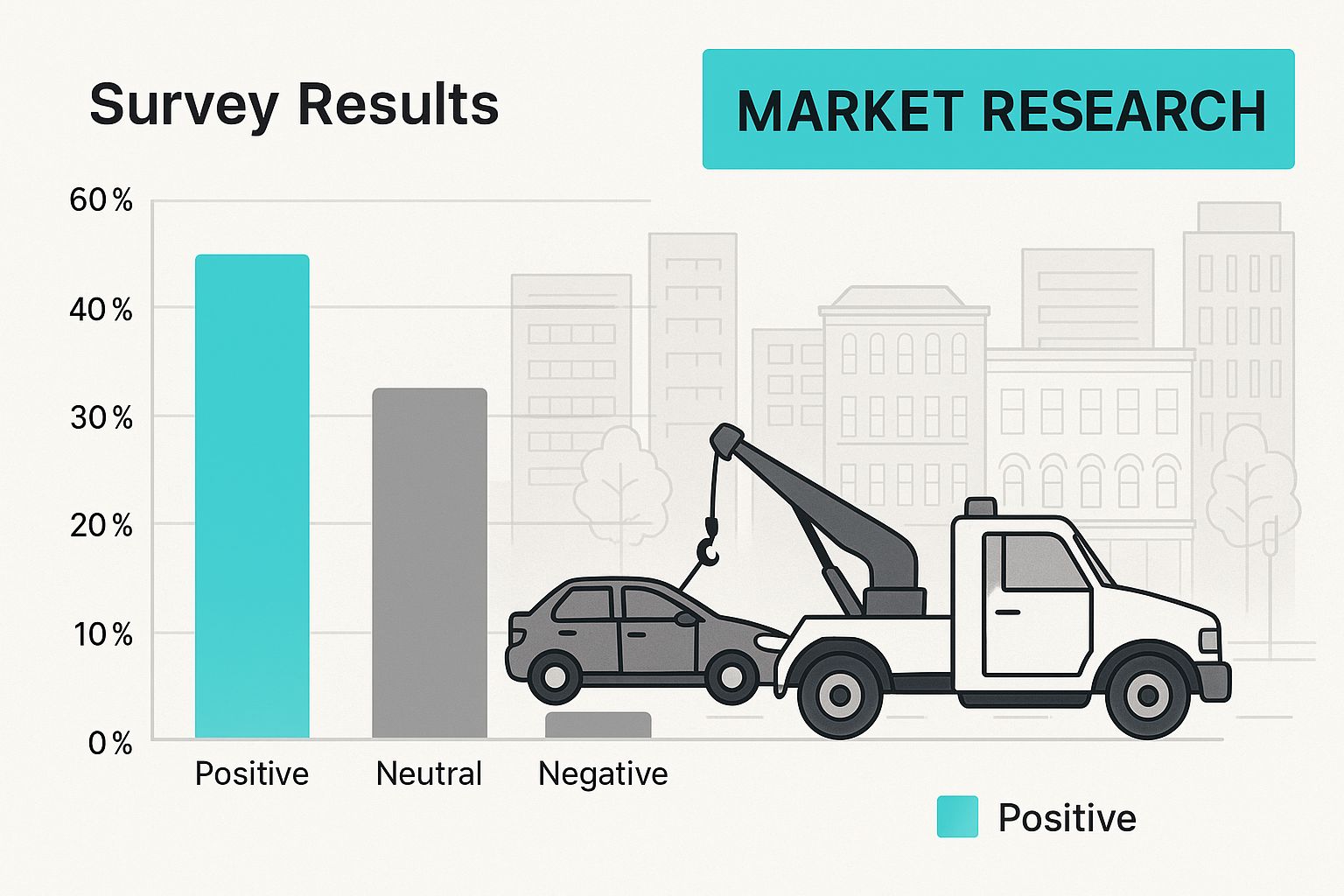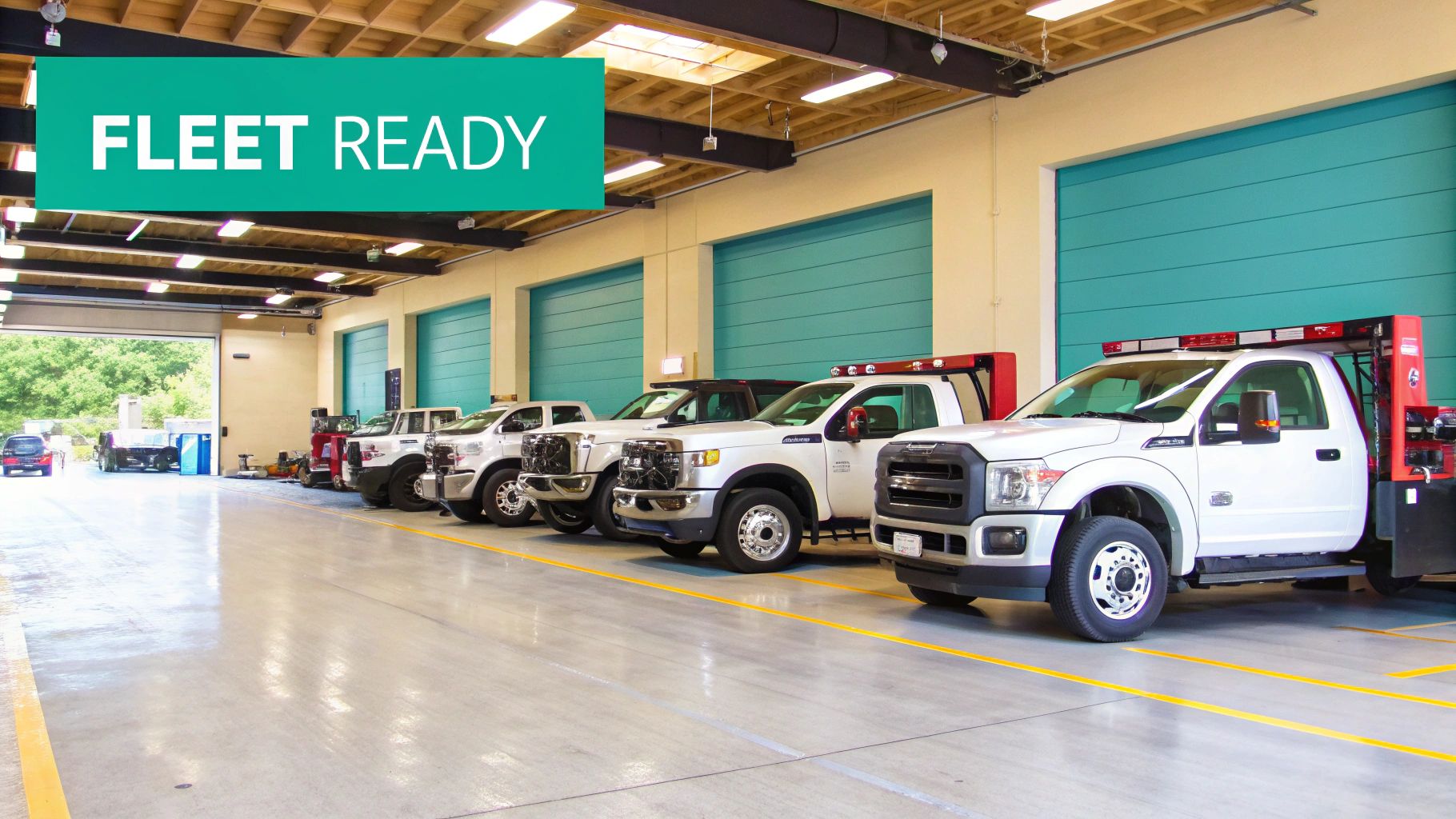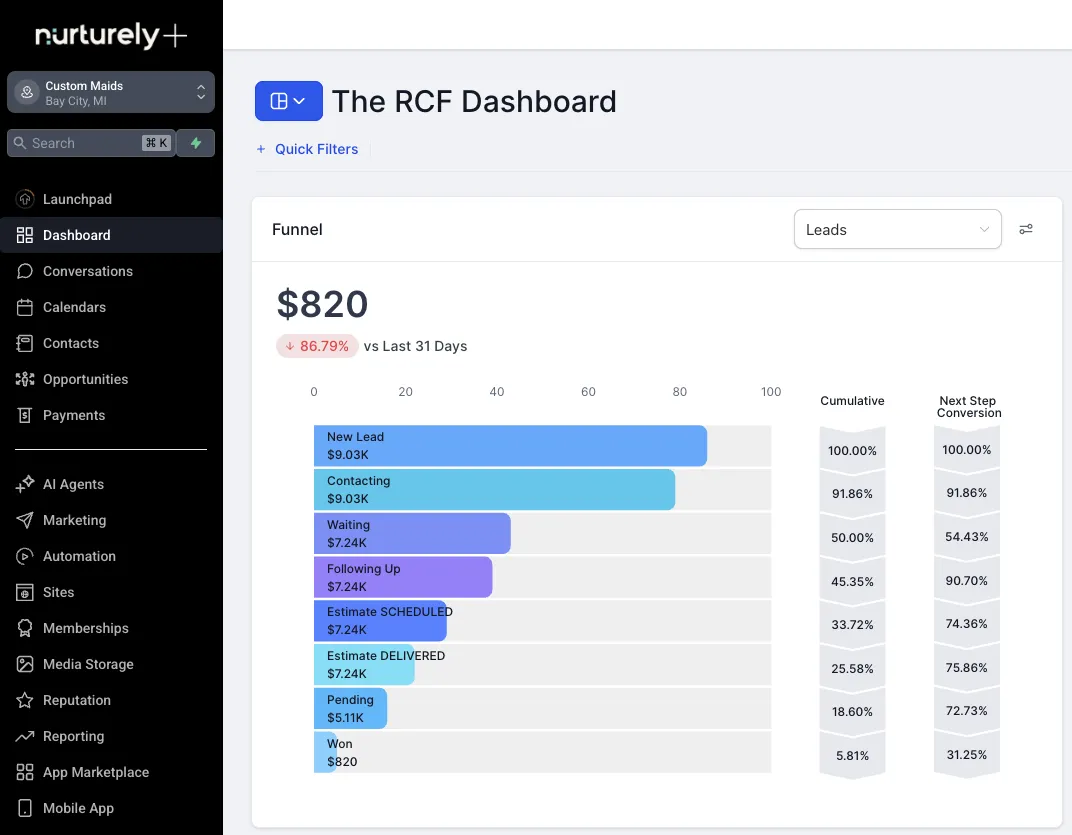How To Start A Towing Company
How to Start a Towing Company: Your Complete Guide
Jumping into the towing business is about more than just buying a big truck and slapping a logo on the side. I've seen too many people try that, only to find themselves stalled out within a year. The real first step—before you spend a single dollar on equipment—is understanding the road ahead. It's about knowing your local market like the back of your hand and figuring out exactly where you fit in.
The good news? The industry is on a solid growth track. We're talking about a global market that was valued at around USD 8.28 billion in 2025 and is projected to hit USD 11.18 billion by 2030. That growth is driven by more cars on the road and tighter traffic laws, which means more opportunities for sharp operators. You can dig into the market trend data on knowledge-sourcing.com if you want the full picture.
But those big numbers don't mean anything if you can't win jobs in your own backyard.

Finding Your Niche in the Local Market
Your first real task is to become a local expert. Don't just guess that there's demand. You need to get out there and prove it. This is where you separate yourself from the amateurs.
Scope Out the Competition: Who are the big dogs in your town? What are people saying about them online? Give them a call. Ask for a quote for a simple tow and see how they treat you. You'll learn a ton about their pricing and customer service—or lack thereof.
Hunt for Unmet Needs: Look for the gaps. Maybe everyone is fighting over standard passenger car tows, but no one is equipped for heavy-duty recovery. Or perhaps the local guys take forever to respond to private property calls, leaving property managers frustrated. That's your opening.
Talk to Your Future Customers: This is huge. Walk into local auto repair shops, body shops, and property management offices. Ask them who they use for towing and what they wish was better. Their pain points are your business plan.

The image above really nails it: success starts with deep-diving into your specific service area, whether it's a busy city or a spread-out rural county. Your strategy has to match the territory.
Choosing Your Core Service Model
Once you have a feel for the local landscape, it's time to decide what kind of towing company you want to be. Each business model comes with its own set of clients, challenges, and rewards. I've seen many new owners get overwhelmed trying to do everything at once.
Pro Tip: Don't try to be everything to everyone, especially not on day one. Pick one thing and get great at it. Whether it's becoming the most reliable private property impound service or the fastest roadside assistance for a motor club, mastering a single service builds your reputation and gets cash flowing.
Once you’re the go-to for one thing, you can start branching out. The table below breaks down the most common paths you can take. Think about which one best fits the opportunities you uncovered in your research.
Core Towing Service Business Models

Each of these models demands a different approach. Police rotations are about compliance and reliability. Commercial work is all about building relationships and trust. As you map out how to start your towing company, the model you choose will shape everything from your initial investment and truck purchases to how you market yourself. Choose wisely.
Crafting Your Business Plan and Legal Foundation
Let's talk about your business plan. A lot of people see it as just some formality to get a loan, but that’s a huge mistake. A real business plan isn't a generic template you fill out once and forget. It's your operational blueprint for success, especially when you want to start a towing company. Trying to wing it is a fast track to failure in this industry.
Forget about vague goals. Your plan needs to get into the nitty-gritty of how you'll actually operate day-to-day. This means doing more than just listing your competitors. You need to dig deep. What are their real-world rates for a 10-mile tow? How fast are they showing up on a Saturday night? What are their customers really saying in those Google reviews? Answering these questions gives you the hard data you need to build a strategy that can actually compete.

Structuring Your Towing Business for Protection
One of the first, and most critical, decisions you'll make is your business structure. This isn't just paperwork; it has massive implications for your personal liability, how you're taxed, and your ability to get funding down the road. While a sole proprietorship is easy to set up, it offers zero protection for your personal assets. That's a gamble you don't want to take in a business where accidents can and do happen.
For most new towing businesses, forming a Limited Liability Company (LLC) is the smartest move. An LLC creates a legal wall between your business and your personal life. If something goes wrong on a job and your business gets sued, this structure helps protect your home, your car, and your personal savings. It ensures they sue the company, not you.
You could also form a corporation (S-Corp or C-Corp), which offers similar protection but comes with a lot more red tape and complex record-keeping. It’s always smart to have a quick chat with a legal pro to see what’s best for your specific situation, but honestly, for most startups, the LLC hits that sweet spot of protection and simplicity.
Key Takeaway: Don't default to a sole proprietorship just to save a few hundred bucks. Investing in an LLC from day one is one of the most important forms of insurance you can buy. It's about protecting your personal financial future from business risks.
Your Essential Legal and Licensing Checklist
Once you've picked your business structure, it's time to tackle the web of federal, state, and local rules. Miss one thing here, and you could be looking at hefty fines or even getting shut down before you tow a single car. This part isn't fun, but it's absolutely non-negotiable.
Here’s a straightforward checklist to get you through the bureaucracy:
Get Your EIN: First things first, apply for an Employer Identification Number (EIN) from the IRS. It’s free, and it's basically a Social Security number for your business. You'll need it to open a bank account and file taxes.
State and Local Business Licenses: Head down to your city hall and check in with your state's Department of Transportation (DOT). They'll give you the rundown on the specific permits and licenses you need to operate in your area, which can include things like consent tow permits or police rotation licenses.
Vehicle and Driver Compliance: Make sure your trucks and drivers are up to code. As you build your business, keeping up with transport regulations is critical. For many operators, it's smart to stay compliant with DVSA regulations and any similar U.S. standards to keep everyone safe and avoid legal headaches.
Open a Business Bank Account: Seriously, never mix your personal and business money. Use your new EIN to open a dedicated business checking account. This keeps your bookkeeping clean, makes tax time way easier, and is crucial for maintaining the liability shield your LLC provides.
Taking the time to navigate this legal landscape properly is how you start a towing company on solid ground. Treat this process with the seriousness it deserves, and you'll build a resilient foundation for a profitable, long-term business.
Navigating Insurance and Startup Funding

Let's talk about two of the biggest hurdles that trip up new towing company owners: insurance and funding. Getting these right from day one is non-negotiable. Your insurance policy isn't just another box to check—it's the absolute bedrock of your business, every bit as critical as your truck's engine.
A single on-the-job incident without the right coverage can wipe you out. We’re talking about losing your business and personal savings in the blink of an eye.
Skimping on insurance is a classic rookie mistake, and it can be devastating. Imagine you’re carefully towing a brand-new luxury SUV, but something fails with the hookup, and it rolls into traffic. If you don't have the right policy, you are personally on the hook for every single dollar of damage. That’s a gamble no serious entrepreneur should ever take.
Securing Non-Negotiable Towing Insurance
To operate both legally and safely, you need a multi-layered insurance plan built specifically for the towing industry. This is not your standard commercial auto policy. It has to cover the unique, high-stakes risks you face every single time you answer a call.
Here are the policies you absolutely must have in place:
On-Hook Towing Insurance: This is the big one. It covers the customer's vehicle while you are actively towing it. If the car you're hauling gets damaged in transit—whether from an accident, fire, or collision—this policy is what pays for the repairs. It's the core of your liability protection.
Garagekeepers Liability Insurance: If you plan on storing customer vehicles at your lot, even for a few hours, this is essential. It protects you if a vehicle is damaged, vandalized, or stolen while it's in your care, custody, and control.
Commercial Auto Liability: This policy covers your tow truck itself. It handles bodily injury and property damage you might cause while driving to or from a job. State minimums for commercial vehicles like tow trucks are typically very high, and for good reason.
Expert Insight: Don't just grab the cheapest quote you find. A low-cost policy often means you're dealing with massive coverage gaps and a sky-high deductible. You need to work with an insurance agent who specializes in the towing industry. They know the difference between policies and can build a plan that truly protects you from a business-ending lawsuit.
Funding Your Towing Company Startup
Once you have a handle on your insurance needs, the next big challenge is funding. Tow trucks and all the necessary gear represent a significant investment, and most new owners need a financial boost to get off the ground.
This is where a rock-solid business plan comes in. Your market research, financial projections, and clear vision are what convince lenders you're a good bet. They're funding a business, not just buying you a truck.
Fortunately, the industry's growth can work in your favor. In the United States, automobile towing has shown consistent growth, with projected revenues expected to hit $14.5 billion by 2025. This steady upward trend, driven by more cars on the road, makes a well-planned towing business an attractive investment.
When it comes to financing, you have a few avenues. The key is finding the right fit for your specific situation. To really get a grasp on the different kinds of financial support out there, you should explore the top startup funding options available to get your venture launched.
Here are a few of the most common routes to consider:
SBA Loans: The Small Business Administration (SBA) partially guarantees these loans, making it easier for new businesses to get approved by traditional lenders. The SBA 7(a) loan is a popular choice for covering everything from equipment to working capital.
Equipment Financing: This is a loan designed specifically for buying your tow truck and gear. The truck itself acts as collateral, which can make these loans much easier to secure than a general business loan.
Business Lines of Credit: This gives you flexible access to cash for ongoing expenses like fuel, insurance premiums, and unexpected repairs. You only pay interest on what you use, making it an incredible tool for managing cash flow.
Tackling insurance and funding takes careful planning and a sharp eye for detail. But by getting the right protection and securing the best financial path, you’re setting your new towing business on a solid foundation for long-term success.
Choosing Your First Tow Truck and Gear
Let's get one thing straight: your tow truck is more than just a vehicle. It’s your biggest investment, your hardest-working employee, and your mobile office all rolled into one. Getting this choice right from day one is everything. It dictates the jobs you can take, how fast you can respond, and the kind of reputation you build.
This is probably the biggest check you'll write when you start a towing company. Before you even think about makes and models, you absolutely need to understand how vehicle finance works in Australia or wherever you're located. Nailing the right loan or lease is just as critical as picking the right truck. Get it wrong, and you could sink your business before it even gets on the road.
Flatbed vs. Wrecker: Which Is Right For You?
The first real decision you'll make is the type of truck. For a new operator, this usually boils down to two workhorses: the flatbed and the traditional wrecker. Each has its own sweet spot, and the right choice depends entirely on the services you plan to offer.
A flatbed tow truck is the jack-of-all-trades in modern towing. Its versatility is unmatched. By loading the entire vehicle onto a flat, secure platform, you can safely transport anything from all-wheel-drive SUVs and delicate luxury cars to vehicles that are too banged up to roll. It's often seen as the gold standard for a reason.
Then you have the wrecker, also known as a hook-and-chain truck. This is your recovery specialist. When a car is in a ditch, wedged in a tight alley, or stuck somewhere a flatbed can't get to, the wrecker is what gets the job done. While they’re less common for everyday tows now—mostly due to the risk of damaging modern bumpers and complex drivetrains—they are absolutely essential for accident scenes and tough recovery jobs.
From Experience: I started my company with a used flatbed, and it was the smartest move I could have made. It allowed me to handle over 80% of the routine roadside assistance and private property calls in my area. Those are the bread-and-butter jobs that keep the cash flowing consistently.
The New vs. Used Tow Truck Debate
Next, you’ll hit a major fork in the road: buy new or go used? A brand-new truck is tempting. It comes with a factory warranty, top-notch reliability, and that peace of mind you can't put a price on. But it also comes with a serious price tag, often pushing past $100,000.
On the flip side, a used truck can get you operational for a fraction of the cost. The trade-off? You're inheriting its history, which could include hidden mechanical issues and higher maintenance bills down the line.
A well-maintained used truck can be a fantastic value, but you have to do your homework. Get a thorough, independent mechanical inspection before you even think about signing. Pay special attention to the hydraulics, the winch, and the PTO (power take-off) system—these are the components that can lead to eye-watering repair costs.
To help you sort through it, here's a look at the pros and cons.
New vs. Used Tow Truck Comparison

Ultimately, this decision comes down to your starting capital and your tolerance for risk.
Your Essential Onboard Gear Checklist
Your truck might be the star of the show, but it’s only as good as the gear you have on board. Showing up to a job unprepared doesn't just look unprofessional—it's dangerous. A well-stocked truck is a non-negotiable part of being a professional operator.
Here’s a definitive list of gear you absolutely must have from day one:
Recovery Straps and Chains: You'll need a variety of high-strength straps and chains for different recovery situations. Don't skimp here.
Winch with a Strong Cable: This is your muscle for pulling vehicles from tough spots. Make sure it's rated for the loads you plan to handle.
Dollies or Go-Jaks: Absolutely critical. These are essential for moving vehicles with locked or damaged wheels without causing more damage.
J-Hooks and V-Chains: These are the standard tools for creating a secure connection to a vehicle's frame or axle for a safe, damage-free tow.
Safety and Lighting: DOT-compliant emergency lights, traffic cones, safety triangles, and a high-visibility vest. Your safety on the side of the road is paramount.
Basic Roadside Tools: A lockout kit for keys locked in a car, a jump box for dead batteries, a tire iron, and a basic mechanic's toolset will allow you to handle minor roadside jobs and earn extra revenue.
Equipping your truck properly from the start sends a clear message: you're a reliable professional who knows how to handle any situation safely. In this business, that kind of reputation is priceless.
Let’s be honest. For a new towing company, a silent phone is the most expensive sound in the world. You can have the best truck on the road and all the right insurance, but none of it matters if nobody calls. It’s time to build a client engine that makes your phone ring off the hook—a make-or-break step when you start a towing company.
Your game plan has to be a smart mix of old-school, tried-and-true tactics and sharp digital marketing. You need both to build a steady stream of cash and become the name people think of first when they're stuck on the side of the road.
Forging Essential Local Partnerships
Long before a stranded driver ever pulls out their phone to search for a tow, the best jobs are often already spoken for. How? Relationships. Building a network with local businesses and agencies that consistently need reliable towing is one of the most powerful things you can do. These partnerships are your ticket to predictable, recurring work.
Auto Repair and Body Shops: These guys are your natural allies. You need to walk into every single shop in your area, introduce yourself, and leave a stack of business cards. But don't just drop them and dash. Ask about their current towing setup. Find out what annoys them. Nine times out of ten, it’s slow response times. If you can promise—and actually deliver—faster service, you've immediately got a foot in the door.
Property Managers: Think about it: apartment complexes, shopping centers, and HOAs are always dealing with illegally parked or abandoned cars. Landing a private property impound contract is a goldmine. Start networking with property management firms to get on their approved vendor list. It’s consistent, high-volume work.
Police Rotations: Getting on the rotation list for the local police or state highway patrol is a huge milestone for any towing business. The requirements are tough, no doubt. You're looking at strict background checks, specific truck and equipment standards, and a rock-solid guarantee of 24/7 availability. It can be a bureaucratic headache to get approved, but the sheer volume of accident and incident tows makes it a goal worth chasing from day one.
A Quick Tip from Experience: When you visit those auto shops, don't go in empty-handed. Offer a small referral fee for each job they send your way or even a "first tow is on us" deal. It’s a tiny investment that can lock in a loyal partner who sends you a handful of jobs every single week.
Winning in the Digital Arena
While handshakes and local connections are your foundation, your online presence is how you capture those urgent, high-value calls from stranded motorists. When a car dies, the first thing the driver does is grab their phone and search "tow truck near me." If you don't pop up, you might as well not exist.
Your Google Business Profile (GBP) is, without a doubt, your most important digital tool. It's free, and it's what feeds Google Maps and local search results. Optimizing it isn't just a good idea; it's non-negotiable.
Fill Out Everything: I mean everything. Your exact service area, your hours (listing 24/7 is a massive advantage), and a detailed list of every service you offer. Don't leave any field blank.
Use High-Quality Photos: People want to see who they're calling. Upload crisp, clear pictures of your clean, professional-looking tow truck. Add your logo. Maybe even a friendly photo of your team. This builds instant trust before they even pick up the phone.
Get Customer Reviews: This is huge. Actively ask every single happy customer to leave you a review on Google. A steady stream of positive reviews is the strongest signal you can send to both Google's algorithm and potential customers that you're the right choice.
The global towing market is blowing up—it was valued at around USD 6 billion in 2024 and is expected to climb to USD 9 billion by 2033. A lot of that growth is being driven by the tech people use to find help, like mobile apps and search engines. You can find additional insights on the towing market at Business Research Insights to see just how big the digital opportunity is.
Beyond Google, a simple and professional Facebook page can do wonders for building more trust. Post useful stuff, like a quick guide on what to do after a fender bender or how to check your tire pressure. This shows you're a helpful expert, not just another towing service, making you the one people remember when they're in a jam.
Your Questions Answered on Starting a Towing Business
So you're thinking about jumping into the towing business. It’s a good move, but I know you’ve got a ton of questions floating around. It’s about more than just buying a truck and getting your paperwork in order. The real-world challenges—the stuff that happens day-to-day—are what trip up most new owners.
Let's get into some of the most common questions I hear from guys just starting out. I'll give you straight-up answers to help you get moving.
How Much Can I Realistically Make?
This is always the first question, and the honest answer is: it depends. There’s no magic number. Your profit is tied directly to your service area, the kind of tows you're doing, and how much you're willing to hustle. A guy running calls in a busy city with tons of accidents is going to have a much higher ceiling than someone in a quiet, rural town.
If you're a one-man show with a single truck, focusing on things like private property impounds and basic roadside jobs, you could be looking at anywhere from $60,000 to over $150,000 a year. But the moment you add a second truck, land a spot on a police rotation, or lock in some commercial contracts, those numbers can scale fast.
The secret isn't just about bringing money in; it's about keeping your costs down. Fuel, insurance, and maintenance will be your biggest headaches. Control those, and you’re in the game.
Real-World Example: I know an owner who started out with one used flatbed. His first year, he cleared about $75,000 after expenses. By year three, he had two trucks on the road and a solid contract with three local body shops. His gross revenue shot past $250,000. The potential is absolutely there if you build the right relationships and run a tight ship.
What Is the Hardest Part of Running a Towing Business?
The physical work is tough, sure, but ask any seasoned owner and they'll tell you the same thing: the hardest part is the inconsistency. You’re either slammed or you’re dead.
You can have a day with ten calls stacked back-to-back, burning fuel and making money, followed by 12 hours of complete silence. Trying to manage that unpredictable cash flow, especially when you're new, is a huge source of stress.
The other beast you have to tame is the human element. You're almost always meeting people on their worst day. They're angry their car broke down, upset about a crash, or furious they got towed. That frustration gets pointed right at you. You have to learn to develop a thick skin and stay professional. It's not just a nice-to-have skill—it's a survival tool in this line of work.
How Do I Set My Towing Rates?
Pricing is a balancing act. You need to be competitive, but you can’t work for free. Setting your rates in a vacuum is the fastest way to go out of business.
First, do your homework. Call around to your local competitors. Get a quote for a standard job, like a 5-mile tow for a regular sedan. This gives you a clear baseline for what the market will bear.
Next, you absolutely have to calculate your cost per mile. This isn't just about gas. It includes:
Fuel
Truck maintenance and depreciation
Insurance
Your own time and labor
Once you know what it costs you to roll that truck out of the driveway, you can build a pricing model that guarantees you make money on every single call. A common structure is a base hook-up fee (somewhere in the $75 - $125 range) plus a per-mile charge (usually $4 - $7 per mile).
And don't forget to bill for the extra stuff. Winch-outs, dollies, after-hours calls, or anything that takes more time or adds risk needs to have a price tag on it.
Can I Start This Business on the Side?
You can try, but it's tough to make it work. Towing is all about one thing: being available right now. When someone’s car dies on the highway at 2 p.m., they can’t wait for you to clock out of your day job. If you can't answer the phone, that call—and the money—is going straight to the next guy on the list.
The only way a part-time model really works is if you find a very specific niche that you can schedule in advance. For example, you could focus exclusively on transporting cars for dealerships or moving vehicles to and from auto auctions.
But if you want to tap into the really profitable work—roadside assistance and accident recovery—you have to be ready to commit to it full-time. There's just no way around it.
Running a business means you’re managing every customer from the first call to the final payment. The team at Nurturely Plus built an all-in-one CRM platform made for service businesses like ours. It helps you track calls, manage your clients, and automate the follow-up, freeing you up to focus on growing your empire. See how you can get your operations in order at https://nurturely.io.








